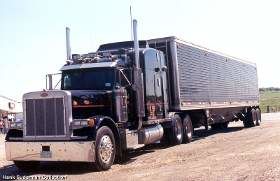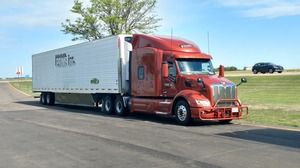Prime Trucking Flatbed Division: Comments & Complaints?
Topic 5782 | Page 1

I been in Primes flatbed division for almost 6 months as a company driver and am loving it. The pet policy is $1000, but they can take it out of your check in $50 or $100 payments a week. The lightweight refrigerated company drivers actually make more per mile. Don't lease, company drivers do well at Prime.

I been in Primes flatbed division for almost 6 months as a company driver and am loving it. The pet policy is $1000, but they can take it out of your check in $50 or $100 payments a week. The lightweight refrigerated company drivers actually make more per mile. Don't lease, company drivers do well at Prime.
Thanks for jumping in! What about strength? You gotta be able to bench 150 to strap stuff down securely, or are those tie downs on flatbeds mechanically leveraged so anybody could get em tight?
-Jason E.
HOS:
Hours Of Service
HOS refers to the logbook hours of service regulations.
Strapping is the easy part. There's a cheater bar for tightening them plus some loads like sheet rock you don't tighten the straps super tight or you damage the product. The hardest part is tarping, tarps are heavy.

I did both reefer & flatbed with Prime. Hardest part of doing flatbed is knowing how to secure your loads. They have a great training program for teaching you what you need to know for that, so no problem there.
As far as having a lot of strength, not needed. I know of lots of gals both at Prime & other companies that do flatbed and do not have an issue with securing the loads.
The biggest things I liked about flatbed are 1) most loads are loaded/delivered during the day during the regular work week, 2) variety of what you do.
With reefer, you have some very crazy hours. Deliver/pickup all hours of the day/week. Also for me it got boring because of having to sit & wait at shipper/receiver for hours most of the time.
If I did not have some things change at home needing to get home more, I would still be at Prime pulling a flatbed.
Ernie
Shipper:
The customer who is shipping the freight. This is where the driver will pick up a load and then deliver it to the receiver or consignee.
Reefer:
A refrigerated trailer.
OWI:
Operating While Intoxicated

I just started trucking a little more than a year ago. Started with Prime. Been driving reefer as a company driver. I don't have many financial responsibilities right now so I don't push myself real hard at all. Not counting the weeks of the truck in the shop. ..or taking 4 days hometime. ..my bad weeks are grossing $500. Good weeks grossing $1100. Guessing the average to be $800. I researched over a year...no regrets@ Prime.
Reefer:
A refrigerated trailer.
I'm out on TNT with Prime on a flatbed and loving it. You don't have to be super strong to do the work. As was said above, the tarps are the heaviest things you have to deal with, and I am learning how to leverage everything, including those. I've met women who can't weigh more than a buck ten who are doing flatbed.
I'm learning securement now. The basic ideas aren't hard, but it's the details where having a trainer walk me through it makes all the difference.
Guarantee is $700 per week once you start TNT by the way.
HOS:
Hours Of Service
HOS refers to the logbook hours of service regulations.TNT:
Trainer-N-Trainee
Prime Inc has their own CDL training program and it's divided into two phases - PSD and TNT.
The PSD (Prime Student Driver) phase is where you'll get your permit and then go on the road for 10,000 miles with a trainer. When you come back you'll get your CDL license and enter the TNT phase.
The TNT phase is the second phase of training where you'll go on the road with an experienced driver for 30,000 miles of team driving. You'll receive 14¢ per mile ($700 per week guaranteed) during this phase. Once you're finished with TNT training you will be assigned a truck to run solo.

Thanks everyone for the input! I despise the idea of team driving, and feel like it'd be a long 8 weeks. I think I'll be better off doing regular hauls, and consider Prime Flatbed after I have enough experience that I can skip the trainer stage (anyone know how long that is?).

Thanks everyone for the input! I despise the idea of team driving, and feel like it'd be a long 8 weeks. I think I'll be better off doing regular hauls, and consider Prime Flatbed after I have enough experience that I can skip the trainer stage (anyone know how long that is?).
You will have training when you first start driving which you may already know. Now if you get a few months or a few years of normal OTR driving and want to switch to flatbed YOU WILL go back into a flatbed training truck. No getting out of the training. Either do it all at once... Normal training and flatbed training or do it separately. Either way there will be no getting around being in a training flatbed truck.
OTR:
Over The Road
OTR driving normally means you'll be hauling freight to various customers throughout your company's hauling region. It often entails being gone from home for two to three weeks at a time.
New Reply:
New! Check out our help videos for a better understanding of our forum features

















Preview:
This topic has the following tags:
Prime Inc Werner Enterprises CDL Pre-Hire Choosing A Trucking Company Flatbed







 TT On Facebook
TT On Facebook
See also: Prime Inc Paid CDL Training Program Review
Hey All, I just got off the phone with a recruiter from Prime Trucking. They said everything looks good and I should have my pre-hire in a couple days. So, school doesn't start for me for another two-weeks and I've got a pre-hire with Werner, Prime, and Swift. I'm considering them in that order as well. I was looking for thoughts on Prime here. I've read a lot about them. The recruiter says if I did refrigerated, I'd eventually have to lease to make money (uhm, what?). If I went flatbed, which she suggested is best for where I live, I'd be team-drive training for approximately 8 weeks, at $500 week for the first 5 weeks, and $700 week every week after that. At this point, I'd go out on my own in my own truck, and company drivers get 40 cents per mile, and an additional $50 every time I have to tarp something.
Werner seemed like the best company, but looking at the numbers here, it seems I may be better off with Prime. I'm not sure their pet policy, that's a big one for me. My concern is that flat beds usually have straps, and I imagine it taking ALOT of strength to strap down some of these loads I see on flatbeds, and a lot of strength is one thing I don't have. Would this be an issue? I've been thinking about leasing (outside of the company) 6-9 months down the road to have my own truck and run my own policies, without being strapped down to a company. I'd appreciate any input here, as my gut tells me Werner but .40 per mile looks pretty good as well.
Regards, Jason E.
CDL:
Commercial Driver's License (CDL)
A CDL is required to drive any of the following vehicles:
Pre-hire:
What Exactly Is A Pre-Hire Letter?
Pre-hire letters are acceptance letters from trucking companies to students, or even potential students, to verify placement. The trucking companies are saying in writing that the student, or potential student, appears to meet the company's minimum hiring requirements and is welcome to attend their orientation at the company’s expense once he or she graduates from truck driving school and has their CDL in hand.
We have an excellent article that will help you Understand The Pre-Hire Process.
A Pre-Hire Letter Is Not A Guarantee Of Employment
The people that receive a pre-hire letter are people who meet the company's minimum hiring requirements, but it is not an employment contract. It is an invitation to orientation, and the orientation itself is a prerequisite to employment.
During the orientation you will get a physical, drug screen, and background check done. These and other qualifications must be met before someone in orientation is officially hired.